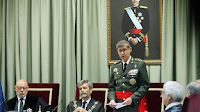On 26 October 2022, the
Globe and Mail ran a front-page story about former members of various armed forces who joined the 'International Legion for the Defence of Ukraine'. This formation was formed relatively soon after the Russian invasion of Ukraine (or, perhaps more accurately, the most recent Russian invasion of Ukraine) in February of this year. Some commentators have likened it to the 'International Brigades' of the Spanish Civil War. Canada's contribution was the MacKenzie-Papineau Battalion, named after the leaders of the 1837 'rebellions' in Upper and Lower Canada, respectively. However, most participants in the International Brigades generally identified as socialists or even communists, who fought with the Republican forces against the fascists in Generalissimo
Francisco Franco's Nationalist regime.
As
Mark MacKinnon of the
Globe and Mail wrote in his report, "Inside the motley collection of foreign adventure seekers, criminals and con artists who fight for Ukraine" (the online version is entitled "
Ukraine’s Foreign Legion offers a shot at redemption for fighters from around the globe"), it is clear that many of the 'international' fighters who joined the International Legion do not have communist or socialist beliefs.
Since the article was written by a Canadian journalist for a Canadian newspaper, it is not surprising that a former, and, arguably, infamous, former Canadian soldier was featured in the lead paragraphs. Mr. MacKinnon began his in-depth report by featuring
Robert Semrau, a former officer of the Royal Canadian Regiment (RCR) who was charged and tried by court martial over a decade ago for his actions in Afghanistan in late 2008. [And, by way of full disclosure, I was on that tour, in the same organization, but was not directly involved in the Code of Service Discipline process.]
The then-Captain Semrau was a Mentoring Team Leader with the Canadian Operational Mentoring and Liaison Team (OMLT) deployed to southern Afghanistan, and assigned to assist the 1st (Hero) Brigade of 205 Corps of the Afghan National Army (ANA). While the OMLT was based principally in the province of Kandahar, it sometimes operated further afield. And 14 years ago, in October 2008, the then-Captain Semrau was with his small mentoring team, accompanying the ANA company they were mentoring, in Helmand Province.
While I do not propose to delve into the details of the allegations here, at one point during the operation, it was alleged that Semrau shot a seriously wounded and unarmed belligerent -
i.e., a belligerent who was
hors de combat. The matter was eventually reported to Canadian leadership by an Afghan 'interpreter', which precipitated an investigation by the Canadian Forces National investigation Service (CFNIS). Semrau was eventually charged with multiple offences, including: second degree murder (contrary to s 235 of the
Criminal Code); attempt to commit murder using a firearm (contrary to s 239 of the
Criminal Code); negligent performance of a military duty (contrary to s 124 of the
National Defence Act (
NDA)); and, disgraceful conduct (contrary to s 93 of the
NDA). The charges under the
Criminal Code were laid pursuant to para 130(1)(b) of the
NDA, which permits offences under other acts of Parliament, when arising outside Canada, to be charged and prosecuted under the Code of Service Discipline.
NB: Semrau was
not charged with a grave breach of the Geneva Conventions under Canada's
Crimes Against Humanity and War Crimes Act, SC 2000, c 24. So, while some news media at the time may have speculated on whether his actions constituted a war crime, none of the offences established under the
Crimes Against Humanity and War Crimes Act were charged or prosecuted in this matter.
Semrau was tried by General Court Martial, and was found guilty of disgraceful conduct. He was subsequently sentenced by the presiding military judge, Lieutenant-Colonel (LCol)
Jean-Guy Perron (a former infantry officer himself):
R v Semrau, 2010 CM 4010. LCol Perron's sentencing judgment is an object example of clear, concise, and reasoned application of mitigating and aggravating factors in a politically sensitive matter that was the subject of significant scrutiny and speculation in the national news media.
Semrau was sentenced to Dismissal from Her Majesty's Service and reduction in rank to Second Lieutenant. The sentence is noteworthy, as Mr. MacKinnon reported in his recent newspaper article that Semrau was "... dishonourably discharged from the Canadian military ...". While that terminology is frequently used by news media, it is also incorrect, and is very likely the product of the influence of American movies and television.
The terms 'discharge' is not used to describe any release of a CF member under
art 15.01 of the Queen's Regulations and Orders for the Canadian Forces (QR&O), whether voluntary or involuntary. Where a CF member is released under 'item' 3 (medical), item 4 (voluntary), or item 5 (service completed), the term used in the notation of the member's record of service is "Honourably Released". If the CF member is released under item 2 (unsatisfactory service) the term used is "service terminated". When a CF member is released under item 1 (Misconduct), as in the case of Semrau, the notation will be “Dismissed with Disgrace for Misconduct” or “Dismissed for Misconduct”, as applicable. In Semrau's case, it was the latter.
For a greater explanation regarding 'release items', see: "
A Word or Two on Release Items in the Canadian Forces", 18 January 2021.
































